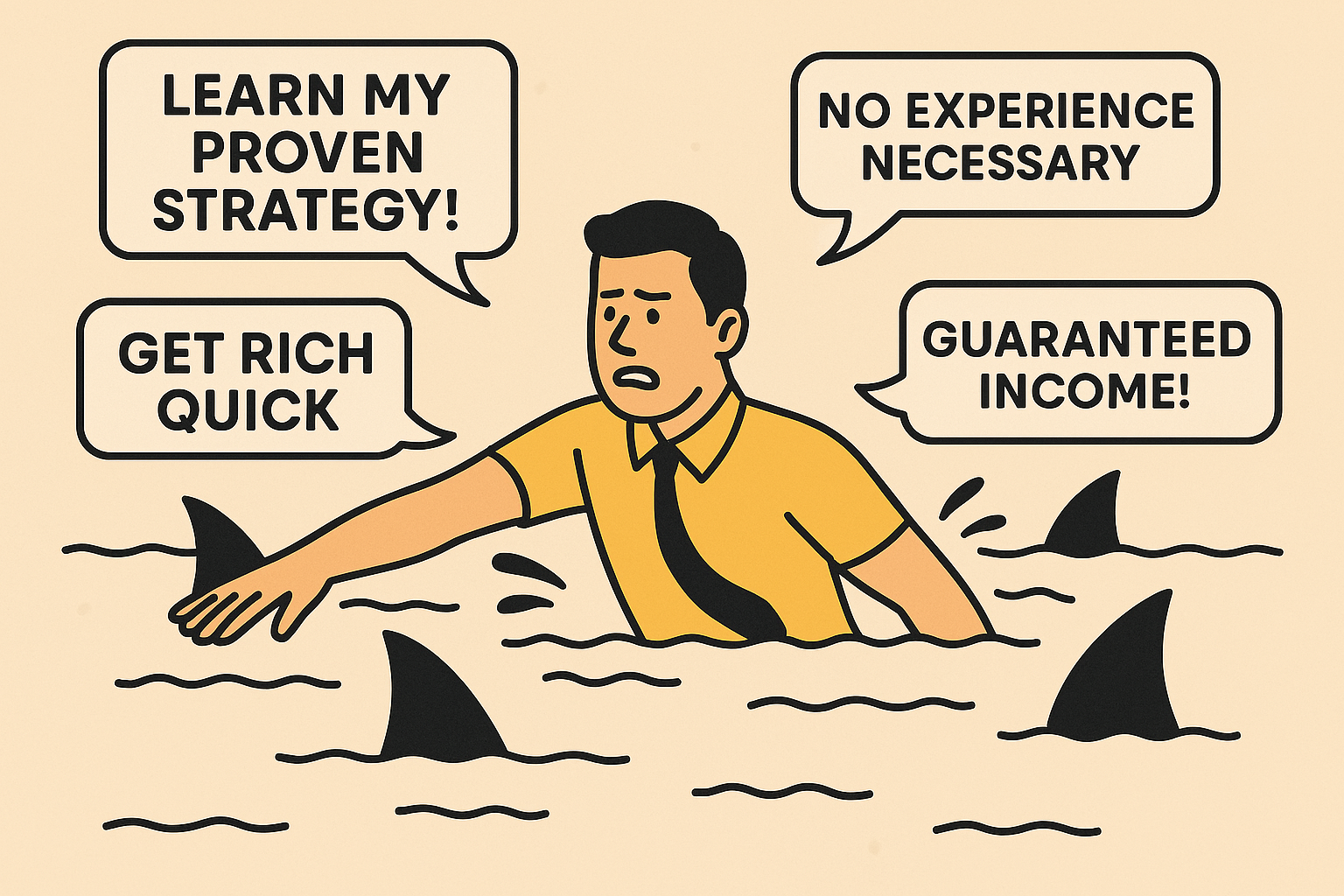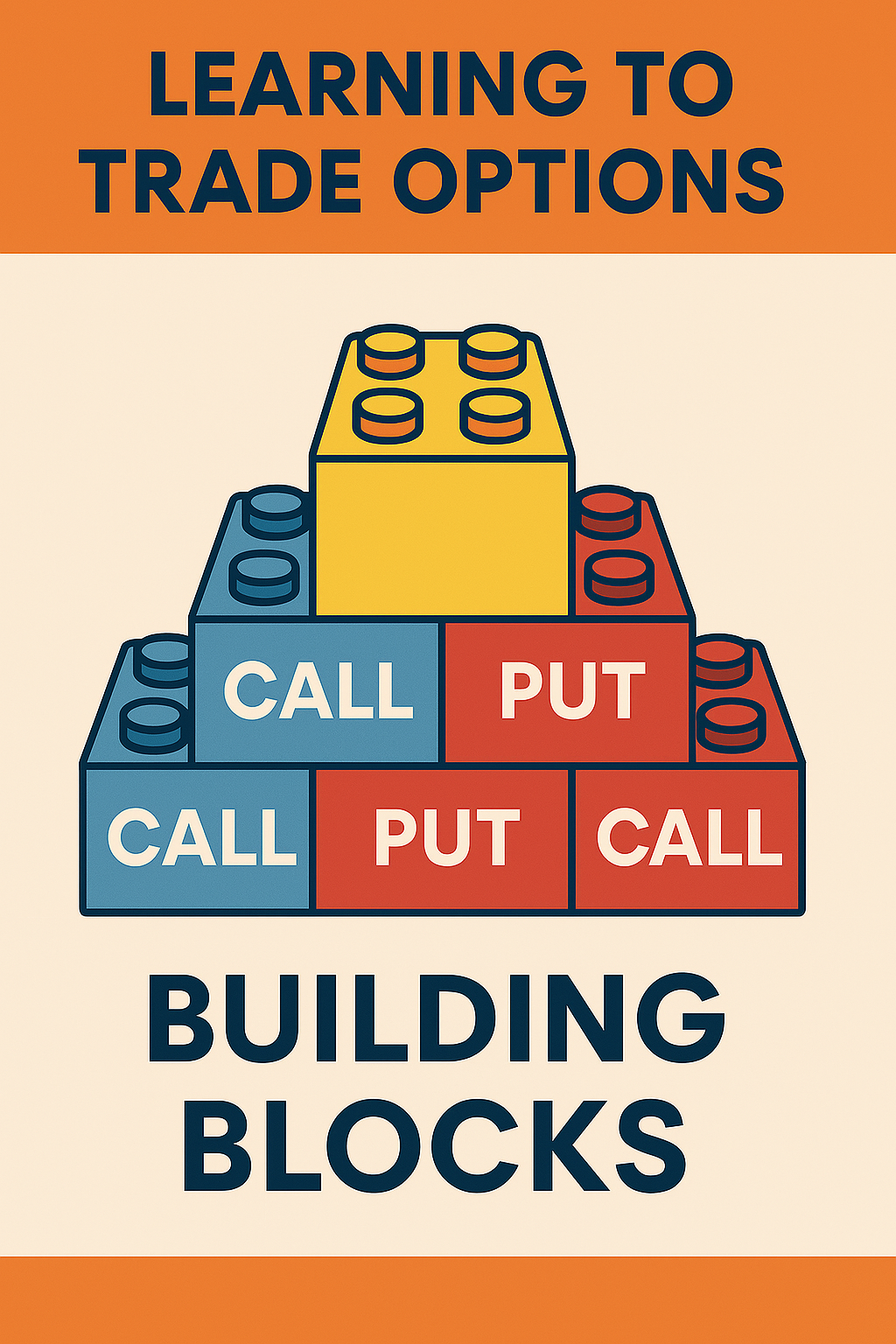Introduction to Trading Education
The world of trading is often likened to navigating shark-infested waters, where new traders can easily feel overwhelmed by the sheer volume of information, choices, and persuasive marketing tactics that characterize this field. As individuals embark on their trading journey, they encounter a dizzying array of educational resources promising success, but not all of these avenues lead to profitable outcomes. It is essential to recognize both the potential benefits and pitfalls inherent in trading education.
Many newcomers approach trading with enthusiasm, believing that the correct education and guidance can unlock the secrets to financial independence and success. However, the reality is that the landscape of trading education is fraught with challenges. This sector has been inundated with various courses, webinars, and mentorship programs, often marketed aggressively by individuals and organizations looking to capitalize on the aspirations of novice traders. The saturation of the market makes it difficult for new traders to distinguish between genuinely valuable resources and those that merely seek to take advantage of their lack of experience.
Amidst this complexity, it is crucial for aspiring traders to equip themselves with a discerning eye, focusing on credible sources of information and fostering a clear understanding of the trading principles that underpin sound strategy development. A fundamental aspect of trading education involves not only learning the mechanics of trading but also grasping the psychological and risk management components integral to sustained success. By comprehensively understanding both the benefits and potential drawbacks of various educational avenues, new traders can make more informed decisions and better prepare themselves for the often tumultuous nature of the trading environment.
The Allure of Trading Systems
The world of trading education is vast and filled with various trading systems that promise success to aspiring traders. This allure is often rooted in human psychology and the innate desire for achievement. Many traders are drawn to the idea that by adopting a specific trading system or indicator, they can gain an edge in the financial markets. The promise of success entices individuals to invest time and resources into educational programs, hoping to decode the complexities of trading and increase their financial returns.
Among the myriad of trading systems available, there exists a wide-ranging appeal, from automated trading algorithms to comprehensive analysis tools. Each system presents a unique methodology, allowing traders to find one that resonates with their style and preferences. This customization is appealing as it fosters a sense of control over one’s trading journey. Additionally, the impression that others have found success using particular systems further fuels this desire, leading to a perception that these methodologies are gateways to financial independence.
However, emotions significantly influence traders’ decision-making processes. The psychological factors of fear and greed often become intertwined with the usage of trading systems. For instance, a trader may experience fear of missing out (FOMO) when observing the success of peers, pushing them to jump into a strategy without adequate preparation. Conversely, the fear of loss may lead to hesitation and indecision. These emotional responses can undermine the very purpose of trading systems, which are meant to provide structure and strategy. Consequently, while the allure of a successful trading system is strong, maintaining emotional discipline and understanding one’s psychological biases are crucial components that can shape a trader’s success or failure in the long term.
Sales Tactics Used by Trading Educators
In the world of trading education, high-pressure sales tactics employed by certain educators and companies can significantly affect the decision-making process of potential students. One common method is the use of scarcity, where educators may imply that limited spots are available for a course or program. This tactic can create an artificial sense of urgency, compelling individuals to make snap decisions without adequately assessing the program’s value or their own readiness to engage with trading education.
Urgency can also be exacerbated by time-sensitive promotions. Potential students are often presented with limited-time offers, leading them to feel that they must enroll immediately or risk missing out on a valuable opportunity. This pressure can cloud their judgment, making it challenging to objectively evaluate whether the trading education being offered is a good fit for their needs and financial situation. When decisions are made hastily, individuals may find themselves investing in programs that do not yield the promised returns or insights, leading to disappointment and potential monetary loss.
Additionally, testimonials are frequently employed in marketing materials to lend credibility to the trading educators’ claims. While success stories can provide motivational insight, it is crucial to approach these narratives with skepticism. Many testimonials may be cherry-picked from a pool of individuals who experienced favorable outcomes, while neglecting to share experiences of those who did not succeed. This selective presentation of information can create unrealistic expectations and foster a misunderstanding of the risks involved in trading.
Prospective students must remain vigilant and critically assess the sales tactics used by trading educators. Recognizing these strategies can help individuals navigate their educational choices more effectively and, ultimately, lead to better-informed financial decisions in their trading journey.
Recognizing Legitimate Education vs. Scams
As the popularity of trading continues to grow, so too does the number of educational resources available to aspiring traders. However, not all trading education is created equal. Recognizing legitimate education versus scams is crucial for anyone looking to navigate these waters successfully. There are several indicators that can help you discern the quality and authenticity of a trading education resource.
One of the most significant red flags is the presence of unrealistic promises. If an educational program guarantees that you will achieve extraordinary returns within an implausibly short time frame, it is essential to approach with caution. Legitimate trading education emphasizes the importance of skill development and risk management over sheer profitability. If something sounds too good to be true, it likely is.

Lack of transparency is another critical consideration when evaluating trading education. Legitimate institutions provide comprehensive information regarding their curriculum, instructors, and grading criteria. If you encounter a program that is vague about its offerings or the credentials of its educators, this could be an indication of a scam. Transparency in methodology and outcomes is a key feature of trustworthy education.
The presence of high-pressure sales techniques also serves as a warning sign. Genuine educational programs do not rush prospective students into making hasty decisions or require hefty upfront payments without adequate information. If you find yourself feeling pressured to enroll immediately without fully understanding the implications, it is advisable to reconsider.
By being aware of these red flags, traders can better filter through the myriad of educational resources available, choosing those that genuinely contribute to their trading knowledge and skills while avoiding scams that can lead to financial loss and disappointment.
Evaluating Trading Programs and Educators
When it comes to navigating the complex landscape of trading education, evaluating the credibility of trading programs and educators is paramount. With the proliferation of online courses and mentorships, potential traders must adopt a systematic approach to ensure they invest their time and resources wisely. One effective methodology is to begin with thorough research of the educator’s background.
Start by investigating the qualifications and experience of the trading instructor. A reputable educator often shares their trading history, including performance metrics and areas of expertise. Look for professionals with a proven track record in the financial markets, preferably individuals who have traded through various market cycles. Additionally, search for any certifications or industry recognition that may bolster their credibility. Academic credentials or memberships in recognized trading organizations can also indicate a commitment to ethical trading practices.
Next, reading reviews and testimonials can provide valuable insight into the effectiveness of a particular trading program. Look for independent reviews from past students rather than relying solely on testimonials presented on the educator’s website. Forums and social media platforms often feature authentic feedback about various trading courses and educators. Pay attention to patterns in the reviews; consistent mentions of quality instruction or frustrations with misleading promises can guide your decision-making process.
Another critical aspect to consider is the actual value of the strategies being taught. Ask yourself whether the strategies are grounded in solid trading principles and whether they are relevant to your goals. A discerning trader should seek programs that emphasize risk management, realistic profit expectations, and clear, actionable strategies. Be wary of programs that promise guaranteed returns or quick profits, as reputable educators will focus on developing a strong foundation and providing ongoing support.
Real-life Stories: Traders Who Got Burned
Throughout the landscape of trading education, numerous individuals have encountered significant pitfalls, often due to misleading information and subpar resources. Many aspiring traders are motivated by the promise of financial independence and the allure of lucrative markets, leading them to invest in educational courses that ultimately do not deliver the expected results.
One prominent example is that of Sarah, a novice trader who recently left her corporate job to pursue day trading full-time. Eager to learn the trade, she quickly fell into a marketing trap of an online trading course advertised as a “guaranteed path to success.” Despite spending a substantial amount on the course, Sarah found that the curriculum lacked depth and failed to provide practical strategies. As months passed, her initial investments dwindled, leading to considerable financial loss. Sarah’s experience highlights a common theme among traders who seek education: the need for thorough research before committing to any program.
Similarly, another trader named Mike faced a daunting reality after investing in multiple webinars that promised to elevate his trading skills. However, despite attending these sessions, he struggled to apply the concepts effectively. The instructors relied on vague jargon and complex theories, leaving many participants, including Mike, confused and disillusioned. Eventually, the ineffective education led Mike to make hasty trading decisions based on intuition rather than informed strategies, resulting in significant capital erosion.
These stories act as critical reminders of the importance of selecting reputable trading education resources. As the financial market continues to attract new participants, the incidents of traders being burned by inferior educational materials should serve as a cautionary tale. Engaging in extensive research, seeking credible reviews, and connecting with experienced traders can help individuals avoid the traps that many have fallen into before them.
The Role of Regulation in Trading Education
The regulatory landscape surrounding trading education is increasingly complex, yet often lacks the necessary oversight to ensure the quality and integrity of educational offerings. In many jurisdictions, there exists a notable absence of formal regulations governing trading educators and the institutions that provide training. This lack of oversight can result in a wide variation in the quality of education, which can ultimately mislead novice traders who rely on these resources to develop their skills and knowledge.
Trading education can encompass a broad range of instructional materials and programs, from online courses and webinars to one-on-one coaching and mentorship. However, not all educators possess the requisite qualifications or experience to offer accurate, beneficial training. As a result, individuals seeking to enter the trading arena may find themselves inundated with conflicting information and questionable advice. Without a central regulatory body, it becomes exceedingly difficult for students to discern reputable providers from those whose primary aim may be profit rather than education.
Furthermore, the rapid growth of online trading platforms and the democratization of trading resources have inadvertently fostered an environment ripe for exploitation. Some companies employ aggressive marketing tactics promoting unrealistic promises of financial success, enticing potential traders without emphasizing the inherent risks involved. This situation underscores the pressing need for more stringent regulations that hold educators accountable for their claims and the quality of their curriculum.
As stakeholders in the financial industry recognize the importance of consumer protection, there is a growing call for greater regulatory oversight in trading education. Establishing sound guidelines and enforcing accountability can foster a more transparent and trustworthy environment. Ultimately, enhancing regulation will not only protect aspiring traders but also elevate the overall standard of trading education, leading to more informed and capable market participants.
Finding Value in Educational Resources
In the realm of trading education, discerning valuable and trustworthy resources is crucial for both new and experienced traders. With a plethora of options available, traders must approach education with discernment to avoid falling prey to misleading information. To find genuine educational resources, one can start by exploring established educational platforms that are well-regarded in the financial community. Reputable institutions often provide structured courses that encompass the fundamentals of trading, risk management, and technical analysis.
Among the recommended platforms are Investopedia Academy, which offers a wide range of online courses tailored for various proficiency levels. Additionally, websites like Coursera and Udemy provide courses created by industry professionals and educators. These platforms not only cover theoretical concepts but often include practical exercises that enhance the learning experience.
Moreover, evaluating the credentials of instructors is paramount. Experienced traders or financial analysts with a proven track record of success can offer insights that are both practical and applicable. Webinars and live trading sessions hosted by industry experts can also serve as an excellent avenue for education, providing real-time insights into the trading process.
In addition to formal education, engaging with trading communities—such as forums, social media groups, or local trading clubs—can be invaluable. These platforms facilitate discussions among traders, where one can share experiences, strategies, and resources. Peer support and shared learning can significantly enhance one’s comprehension and application of trading principles.
Finally, staying updated with reputable financial news outlets and publications, such as Bloomberg, Investors Business Daily or The Wall Street Journal, can contribute to a trader’s continuous education. Frequent exposure to market analysis and trading strategies helps traders develop a comprehensive understanding of market dynamics, enhancing their overall trading acumen.
Conclusion and Final Thoughts
Navigating the intricacies of trading education is a multifaceted endeavor that requires careful consideration and strategic planning. As the financial markets continue to evolve, the resources available for aspiring traders have expanded significantly. However, with this abundance of information comes the challenge of discerning which educational avenues are genuinely beneficial and which may be inadequate or even misleading. The complexities of trading are not to be underestimated, and prospective traders must engage in due diligence when selecting educational programs or materials.
Self-awareness plays a crucial role in this process. Individuals must assess their personal objectives, risk tolerance, and learning styles. Understanding one’s own strengths and weaknesses enables more informed decision-making regarding which trading education platforms or techniques to pursue. Whether it’s online courses, mentorship programs, or forums, the choice of educational tool should align with the individual’s trading goals and personal growth aspirations. It is equally important to remain adaptable, as trading strategies and market conditions can change rapidly.
Furthermore, making informed decisions is paramount when investing both time and money into trading education. Researching various offerings, seeking out reviews, and potentially trialing different programs can provide valuable insight into their effectiveness. Engaging with the trading community can also yield fruitful discussions and recommendations. In today’s digital age, the collaboration and sharing of experiences among traders can significantly enhance one’s learning path.
Ultimately, successful navigation of trading education requires a balanced approach that combines analytical thinking, self-reflection, and an openness to continual learning. By taking the initiative to understand these complexities, traders can better equip themselves for their journey in the financial markets.



